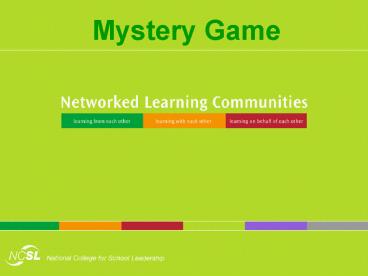Mystery Game - PowerPoint PPT Presentation
1 / 12
Title:
Mystery Game
Description:
To create time and space to reflect on what we do well and. To consider what we ... Why did Tom do less well in his GCSEs than predicted? Doing the task... – PowerPoint PPT presentation
Number of Views:1873
Avg rating:3.0/5.0
Title: Mystery Game
1
Mystery Game
2
Pupil Learning
- Learning from each other
- Learning with each other
- Learning on behalf of each other
3
Aims
- To reflect on pupil learning
- To create time and space to reflect on what we do
well and - To consider what we could do better/differently
- To engage with the knowledge base on learning and
learning loss
4
Video One
5
Mysteries as examples of challenging activities
- The process can help pupils practice and develop
some crucial skills - Sorting relevant information from irrelevant
information - Interpreting information
- Making links between disparate pieces of
information - Speculating to form hypothesis
- Checking and refining
- Explaining
- (Thinking Through Geography, David Leat, 1899857
42 7, published by Chris Kington Publishing, 27
Rathmore Road, Cambridge CB1 7AB. Available
directly from the publisher 30)
6
Mystery
- Primary
- Why did Amit do less well in his Key Stage 2 SATs
than predicted?
- Secondary
- Why did Tom do less well in his GCSEs than
predicted?
7
Doing the task
- You may wish to consider sharing the reading. It
is important that everyone processes all of the
information - Develop an explanation as to why Amit or Tom
failed to do as well as expected - Begin to classify then label the possible
explanations for this
8
How many Toms or Amits do you have in your
school?
9
Video Two
10
Learning Loss the challenges
- Transition
- Assessment
- Knowledge application
- Classroom work
11
Discussion Questions
- Can the learning loss in benign settings be
audited in your school? Where are you strongest?
Where are you weakest? Where might you get best
return on effort? - Who in your network, at whatever level, is doing
good work in any of these settings?
Specifically, what do some teachers already know
and do that might be transferable to other
teachers practices? How can this knowledge be
audited and validated? How can it be represented
(written down, videoed, talked about) in order to
share it?
12
Discussion Questions (cont)
- How might pupils be involved in identifying good
teaching practices. Note here that pupils are
often very conservative of their safe working
practices they notoriously do not like
challenging teaching. There are probably good
reasons for this. What do your staff know/do
about taking pupils beyond the comfort zone of
classroom work? - What leadership and management functions would be
necessary to initiate and sustain these lines of
enquiry and professional development?

